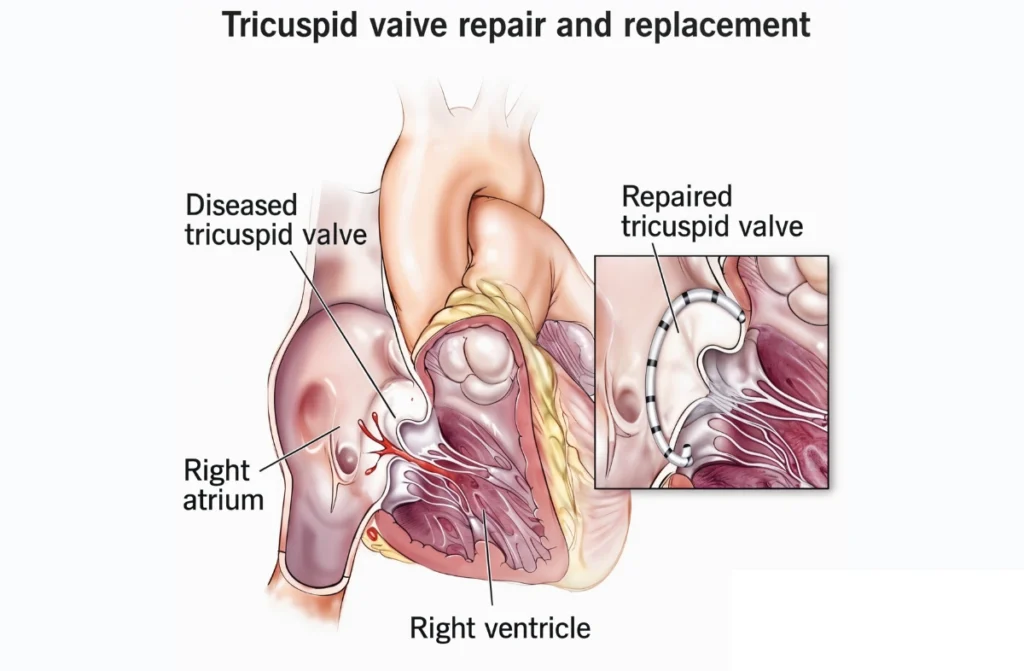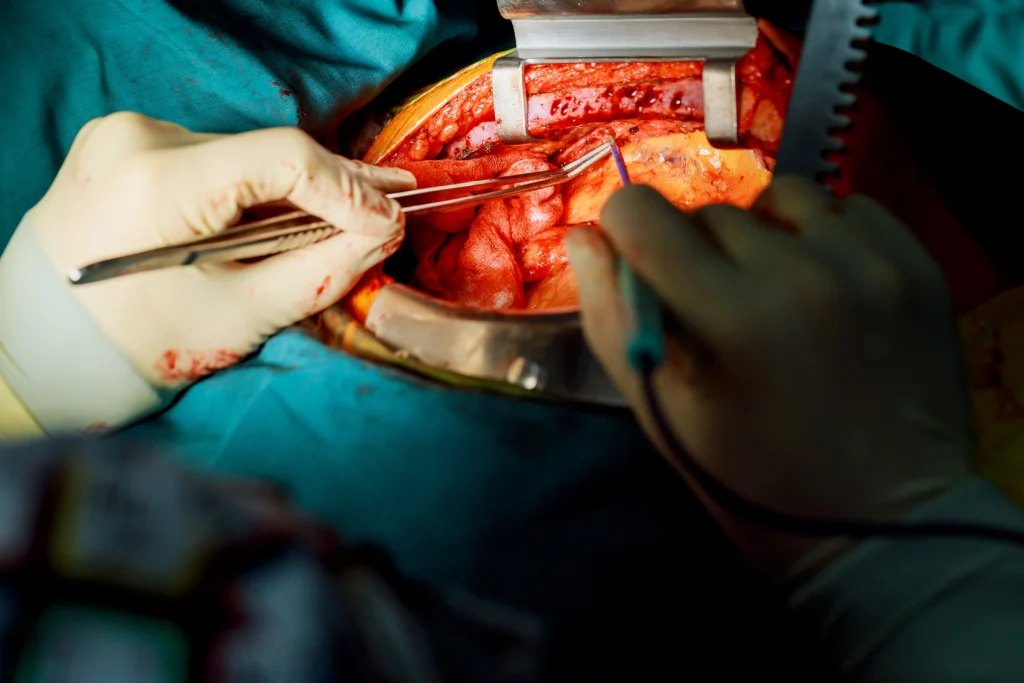Transcatheter tricuspid Valve Replacement in Chennai is a minimally invasive procedure that involves replacing the tricuspid valve through an endovascular approach, without the need for open-heart surgery. It is a non-surgical option for patients with tricuspid valve regurgitation (TR), the largest heart valve on the right side of the heart. Transcatheter TVR is a cutting-edge technology that offers many benefits, including reduced risk of complications, less pain, shorter hospital stays, and quicker recovery time. It is an advanced treatment option for patients with advanced, symptomatic heart failure treatment caused by valvular heart disease.
Understanding Transcatheter Tricuspid Valve Replacement

What is Transcatheter Tricuspid Valve Replacement?
Transcatheter Tricuspid Valve Replacement (TTVR) is a procedure that involves replacing a malfunctioning tricuspid valve with a prosthetic valve through a minimally invasive approach. This technique is particularly beneficial for patients who are high-risk candidates for traditional open-heart surgery. By accessing the heart via a catheter, surgeons can replace the damaged valve without the need for large incisions, thus reducing the patient’s recovery time and associated risks.
The Importance of the Tricuspid Valve
The tricuspid valve plays a crucial role in regulating blood flow between the right atrium and the right ventricle of the heart. When this valve fails to function correctly, it can lead to a condition known as tricuspid regurgitation, where blood flows backward into the right atrium. This condition can cause significant symptoms such as fatigue, swelling, and shortness of breath, severely impacting a patient’s quality of life.
Why Choose TTVR?
For patients suffering from severe tricuspid valve disorders, Transcatheter Tricuspid Valve Replacement offers a less invasive alternative to open-heart surgery. This procedure is especially advantageous for elderly patients or those with other medical conditions that make traditional surgery too risky. The minimally invasive nature of TTVR results in shorter hospital stays, quicker recovery times, and fewer complications.
Causes of TTVR
Transcatheter Tricuspid Valve Replacement in Chennai is a procedure used to treat tricuspid valve disease.
- Tricuspid Regurgitation: Tricuspid regurgitation occurs when the tricuspid valve does not close properly, causing blood to leak back into the right atrium. This condition can be due to various factors, including heart disease, infections, or congenital abnormalities.
- Right-Sided Heart Failure: When the right ventricle of the heart is unable to effectively pump blood into the pulmonary artery, it can lead to right-sided heart failure. Tricuspid valve disease is often associated with this condition and may necessitate TTVR.
- Previous Valve Surgery: Patients who have undergone prior heart valve surgery may develop tricuspid valve issues over time, either due to wear and tear of the valve or complications from the initial procedure, which can prompt the need for TTVR as a corrective measure.
Types of TTVR Approaches
There are currently several types of TTVR (transcatheter tricuspid valve replacement) approaches being developed and used:
- Balloon-Expandable Valves: These valves are mounted on a balloon that is inflated to secure the valve in place within the native tricuspid valve annulus.
- Self-Expanding Valves: These valves have a frame that expands on its own once deployed in the correct position, using the natural pressure of the blood flow to secure it in place.
- Transfemoral Approach: The valve is delivered through a catheter inserted in the groin and guided up to the heart, often suitable for patients with accessible blood vessel routes.
- Transjugular Approach: The valve is delivered through a catheter inserted in the neck or jugular vein and threaded down to the heart, useful when the transfemoral route is not feasible.
- Transapical Approach: The valve is delivered through a small incision in the chest wall and directly into the apex (tip) of the heart, providing a direct route for valve placement.
Each approach has its specific advantages and considerations based on patient anatomy, valve type, and the experience of the medical team performing the procedure.
Read also: Best Cardiologist in Chennai
Benefits of Transcatheter Tricuspid Valve Replacement in Chennai
Transcatheter Tricuspid Valve Replacement offers numerous benefits, particularly for patients who are not candidates for open-heart surgery. These include:
- Minimally Invasive Procedure: The use of a catheter means smaller incisions, reduced pain, and quicker recovery times.
- Lower Mortality Rates: For high-risk patients, this procedure offers a safer alternative with better survival outcomes.
- Improved Quality of Life: Patients often experience relief from symptoms such as fatigue, swelling, and difficulty breathing.
- Shorter Hospital Stays: Most patients can expect to be discharged within a few days after the procedure.
- Enhanced Cardiac Function: Replacing the damaged valve improves blood flow and reduces strain on the heart.
With some of the best cardiac specialists and healthcare infrastructure, Chennai has become a preferred destination for Transcatheter Tricuspid Valve Replacement.
Risks of TTVR
While Transcatheter Tricuspid Valve Replacement is considered safer than traditional surgery, it still carries certain risks, such as:
- Bleeding or Infection: The catheter insertion site may develop complications such as bleeding or infection.
- Valve Malfunction: There’s a small chance of improper placement or valve leakage.
- Blood Clots: These may form during or after the procedure, increasing the risk of stroke or heart attack.
- Arrhythmias: Irregular heart rhythms may develop temporarily or permanently after the procedure.
- Allergic Reactions: Contrast dyes used in imaging may trigger allergic reactions in some patients.
It’s essential to consult an experienced cardiac specialist in Chennai to minimize these risks and ensure the procedure is performed in a well-equipped facility.
Process of Transcatheter Tricuspid Valve Replacement
Pre-Procedure Evaluation
Before undergoing Transcatheter Tricuspid Valve Replacement in Chennai, patients undergo a comprehensive evaluation to determine their suitability for the procedure. This includes diagnostic tests such as echocardiograms, CT scans, and cardiac catheterization to assess the severity of the valve disorder and plan the procedure accurately.
Procedure
- Anesthesia and Sedation: Patients are typically given local anesthesia and mild sedation to ensure comfort during the procedure.
- Catheter Insertion: A catheter is inserted through a small incision, usually in the femoral vein, and guided to the heart.
- Valve Deployment: Once the catheter reaches the tricuspid valve, the new prosthetic valve is carefully positioned and deployed, replacing the damaged valve.
- Completion and Recovery: The catheter is removed, and the incision is closed. Patients are monitored for a short period in the hospital before being discharged.
Post-Procedure Care
After the Transcatheter Tricuspid Valve Replacement, patients are closely monitored for any complications. Most patients can resume their normal activities within a few days, but it is essential to follow the cardiologist’s advice regarding medications, lifestyle modifications, and follow-up visits.
Long-Term Outcomes
The long-term outcomes of Transcatheter Tricuspid Valve Replacement are highly favorable. Patients typically experience significant improvements in symptoms, quality of life, and overall heart function. Regular follow-up visits are crucial to monitor the valve’s performance and address any potential issues early.
Who is the Right Doctor for Transcatheter Tricuspid Valve Replacement (TTVR)?
Dr. M. Kathiresan is a renowned interventional cardiologist with expertise in Transcatheter Tricuspid Valve Replacement in Chennai. His extensive experience and specialization in this cutting-edge procedure make him the right doctor to consult for patients in need of tricuspid valve replacement using minimally invasive, catheter-based techniques. Dr. Kathiresan’s proficiency in TTVR ensures that patients receive the highest level of care and the best possible outcomes for tricuspid valve-related heart conditions.
Treatment for Right Doctor for Transcatheter Tricuspid Valve Replacement in Chennai
Transcatheter Tricuspid Valve Replacement in Chennai is a minimally invasive procedure used to treat tricuspid valve disease when the valve is not functioning properly. During this procedure, a new artificial valve is implanted using a catheter-based approach, avoiding the need for open-heart surgery.
- Patient Evaluation: Before the procedure, the patient undergoes a thorough evaluation to assess their suitability for TTVR. This includes imaging tests, such as echocardiography and cardiac catheterization, to determine the severity of the tricuspid valve disease and the optimal treatment approach.
- Catheter-Based Implantation: TTVR is performed in a specialized cardiac catheterization lab. A thin, flexible catheter is inserted into a blood vessel, often through the femoral vein in the groin or the internal jugular vein in the neck.
- Valve Deployment: Once the catheter is in the right position, the new tricuspid valve, often made of bioprosthetic or mechanical materials, is deployed within the existing valve. The new valve is then expanded, taking over the function of the damaged tricuspid valve.
Comparing TTVR with Traditional Surgery
Traditional Open-Heart Surgery
Traditional tricuspid valve replacement surgery involves a sternotomy (opening of the chest) and cardiopulmonary bypass. While effective, this approach carries higher risks and requires a longer recovery period. It is generally reserved for patients who cannot be treated with less invasive methods.
Advantages of TTVR
- Minimally Invasive: TTVR avoids the need for a sternotomy, reducing surgical trauma and speeding up recovery.
- Reduced Hospital Stay: Patients undergoing TTVR typically have shorter hospital stays compared to those undergoing traditional surgery.
- Lower Risk of Complications: The minimally invasive nature of TTVR results in fewer complications, such as infections and bleeding.
- Faster Recovery: Patients can return to their daily activities more quickly after TTVR.
Patient Selection
The choice between TTVR and traditional surgery depends on various factors, including the patient’s overall health, the severity of the valve disorder, and the presence of other medical conditions. Cardiac surgeons in Chennai carefully evaluate each patient to determine the most appropriate treatment option.
Innovations and Future Directions in TTVR
Technological Advancements
The field of transcatheter valve replacement is continually evolving, with ongoing research and technological advancements improving the safety and effectiveness of the procedure. Innovations such as better imaging techniques, enhanced valve designs, and advanced catheter technology are making Transcatheter Tricuspid Valve Replacement even more effective.
Clinical Trials and Research
Chennai is at the forefront of cardiac research, with numerous clinical trials exploring new techniques and devices for TTVR. These studies are essential for advancing the field and ensuring that patients have access to the latest and most effective treatments.
Expanding Eligibility Criteria
As technology and expertise continue to advance, the eligibility criteria for Transcatheter Tricuspid Valve Replacement are expanding. Initially, this procedure was primarily recommended for high-risk patients, but it is now becoming a viable option for a broader range of patients, including those at intermediate risk.
Patient-Centered Care
The emphasis on patient-centered care in Chennai ensures that each patient receives personalized treatment plans tailored to their specific needs and conditions. This approach enhances the overall patient experience and contributes to better outcomes.
Conclusion
Transcatheter Tricuspid Valve Replacement in Chennai represents a significant advancement in the field of cardiac care. This minimally invasive procedure offers numerous benefits, including reduced recovery times, lower surgical risks, and improved patient outcomes. Chennai’s advanced medical facilities, experienced specialists, and ongoing research make it an ideal destination for this life-changing procedure. As technology continues to evolve and the eligibility criteria expand, more patients will have the opportunity to benefit from Transcatheter Tricuspid Valve Replacement in Chennai.
Also, Read Transcatheter Aortic Valve Replacement In Chennai.


